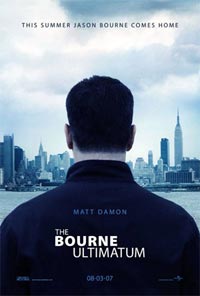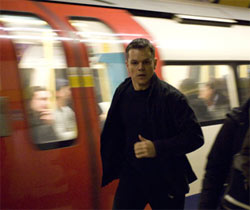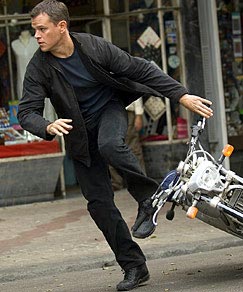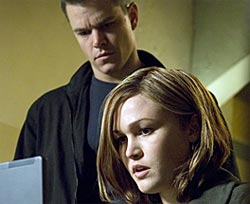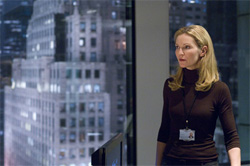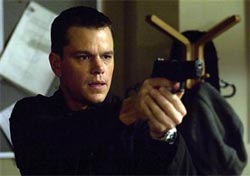Laugh Lines: Rush Hour 3, The Simpsons Movie, Superbad
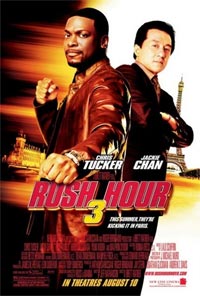 |
Carter: Well for your information, I'm part Chinese now. That's right, Lee. For the last three years, I have studied the ancient teachings of Buddha, earning two black belts in Wu Shu martial arts, spending every afternoon in the Hong Kong massage parlor. I'm half Chinese, baby!
Lee: If you're half Chinese, Im half black. I'm your brother and I'm fly. You down with that, Snoopy? That's dope, innit?
Carter: Sorry, Lee. You can't be black, there's a height requirement.
The Rush Hour movies are indefensible -- the epitome of cynical, packaged entertainment, they're content to throw an Asian action movie legend (Jackie Chan) and a motormouthed black comedian (Chris Tucker) together, let the two stars flounder as they attempt to "riff" off each other, and inject a few stunts to relieve the boredom generated by the "plot."
These films are the modern equivalent of the Crosby-Hope road movies, and like those old chestnuts they succeed for a simple reason: they are fully aware of their awfulness, and are good natured (rather than embarrassed) about it. We're not interested in seeing Chris Tucker and Jackie Chan play real characters in a real story -- we're interested in seeing them pull their usual moves as they struggle to sweet talk or fight their way out of outlandish situations. This time, there's a whole lot of hooey about Triad gangs, an assassination attempt, and a trail that leads to France, which gives our heroes an excuse to visit Paris and do the usual Parisian things -- indulge in some La Cage Aux Folles send-ups, hit the Eiffel Tower for a bit of high-wire martial arts action, and best of all, engage in angry banter with the typical smartass French cab driver (Yvan Attal) who eventually grows wistful at the fact that he's, well, not American: "I will never know what it feels like to kill with no reason." Like I said, awful, but funny nonetheless.
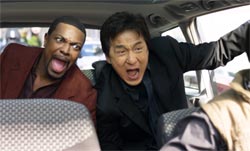 |
In truth, Rush Hour 3 has nothing on Rush Hour 2, which featured Zhang Zi Yi as quite possibly the cutest little assassin you'll ever meet. It's clear that the mismatched-buddy concept is getting stretched pretty thin, and in a concession to Chan's advancing age, none of the action scenes truly pop, although there is a lovely moment in which Chan sprints up a banister to hide himself within the folds of the French national flag, a move that wouldn't have been out of place in a Buster Keaton classic. Meanwhile, Tucker engages in his usual shtick as the ugly-American horndog, offending everyone in the general vicinity with his shit-eating grin. Grandmasters of cinema like Max von Sydow and Roman Polanski are wheeled in, looking faintly aghast, while the estimable Hiroyuki Sanada plays his slick villain (who of course has some old history with Jackie) totally straight, somehow emerging with his dignity intact.
But all of the above is really moot. When Chris finds himself in a "who's on first" routine with the members of a local dojo, or when Jackie and Chris are forced to fend off a bevy of pursuers by crashing in and out of moving cars, or when the duo interrupts a French cabaret act with an improvised version of Elton John's "Sorry Seems to Be the Hardest Word," it's easy to see Rush Hour 3 for what it really is: an excuse to indulge in some debauchery with old friends, at a modest price. Whether you feel guilty in the morning is up to your own conscience.
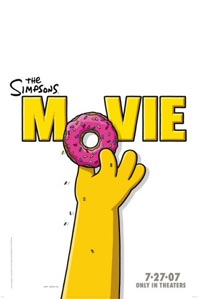 |
The Simpsons Movie (2007, Dir. David Silverman)
Homer Simpson: Homer do good?
Bart Simpson: Actually, you've doomed us all. Again.
Bart Simpson: Actually, you've doomed us all. Again.
Was there any way a Simpsons movie could live up to the hype? For all the spectacular success of the television series, what we tend to remember are the high points, of which there are quite a few (take your pick). It's easy to forget that a lot of the jokes can be scattershot, and that the show has been riding the downward curve the last few seasons. Burdened with so many fine memories, we hope, want, and expect The Simpsons Movie to have all of the goodness and none of the fat.
Mission slightly accomplished. No one will feel guilty about our favorite Springfield family's first foray to the big screen, but no one can deny that it's all about fat -- pig fat, or to be more precise, pig excrement. In his latest affront to sensibilities and common sense, Homer Simpson, clueless and crude as ever, adopts a baby pig and proceeds to dump all its shit in the Springfield River, setting off an incalculable environmental disaster which leads the federal government to physically seal off Springfield from the rest of the world. Separated from his hometown, Homer and his family decide to hightail it to Alaska to escape the authorities, but soon find themselves cast in the unlikely role of saviors as they return to save Springfield...
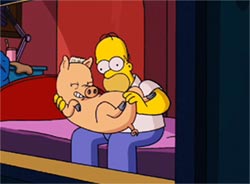 |
Like Rush Hour, the point of a Simpsons story isn't the actual plot, save for a few trenchant comments on the foibles of modern American society. No, what keeps us entertained is observing how the characters' actions snowball into a rampaging avalanche of off-the-cuff slapstick, wordplay, cultural satire, and high and low comedy. This time out there are some decent zingers, including the "Spider-Pig" song (already deployed to such good effect in the trailer), a surprise public service announcement by Tom Hanks ("The U.S. Government has lost its credibility so it's borrowing some of mine"), and throwaway bits like the one in which Homer flips through the Bible during an emergency and wails, "This book doesn't have any answers!"
But as we sit through the equivalent of three TV-sized episodes strung together, fatigue sets in. The major baddie, a militant EPA advisor played by Albert Brooks, lacks the grand absurdity of the series' best villains (Sideshow Bob, where art thou?), and as the film lurches toward the inevitable action-packed climax, missteps accumulate. An episode with Homer and a drugged-out shaman goes nowhere; Marge must once again deride and endure her husband's irresponsibility (yawn); a subplot involving Bart feeling envious of the God-lovin' Smithers family plays it a little too sincere. Over the years, The Simpsons has grown victim to its own runaway success, as it and other bold series (South Park, The Family Guy) have mined its smart-alecky attitude and just-this-side-of-offensive laughs. What worlds are there left to conquer? Ergo, the film's climax, involving a nuclear bomb, a motorcycle, and a glass dome, is both overblown and lacking.
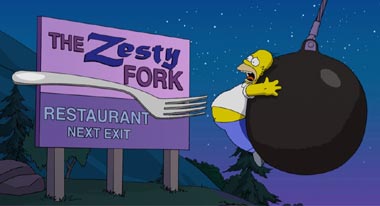
The best Simpsons episodes are neat little fillips in which the family's proclivities, as twisted as they are, impose eventual order on the chaos they create. Think of the episode in which Marge attempts to help the community by censoring the Itchy and Scratchy cartoon show, only to come to the conclusion that the best thing she can do is nothing -- what could be more American than that? In The Simpsons Movie, which saves the day is a little gumption and the love of one's family. It makes sense that such apple-pie creepiness would seep into a feature-length, multi-million dollar film, but it's still a little disappointing that that film happens to be a Simpsons film. "Sequel," pouts Maggie in the movie's final line, and as we steel ourselves for Simpsons 2, we can only hope that a bit more of the show's anarchy and twisted-lemon outlook infects the final product.

The best Simpsons episodes are neat little fillips in which the family's proclivities, as twisted as they are, impose eventual order on the chaos they create. Think of the episode in which Marge attempts to help the community by censoring the Itchy and Scratchy cartoon show, only to come to the conclusion that the best thing she can do is nothing -- what could be more American than that? In The Simpsons Movie, which saves the day is a little gumption and the love of one's family. It makes sense that such apple-pie creepiness would seep into a feature-length, multi-million dollar film, but it's still a little disappointing that that film happens to be a Simpsons film. "Sequel," pouts Maggie in the movie's final line, and as we steel ourselves for Simpsons 2, we can only hope that a bit more of the show's anarchy and twisted-lemon outlook infects the final product.
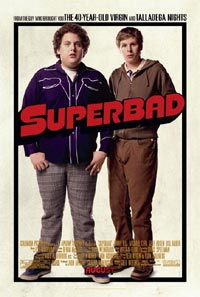 |
Superbad (2007, Dir. Greg Mottola)
Seth: You know when you hear girls say 'Ah man, I was so shit-faced last night, I shouldn't have fucked that guy?' We could be that mistake!
Superbad is a teen exploitation comedy in which not a single breast is glimpsed; a coming-of-age caper in which coming of age is looked on as a scary, tremulous thing; a beer party story in which obtaining the beer and drinking it achieves absolutely nothing. Above all, it is the latest entry from the new comedy factory known as Judd Apatow, who as writer, producer and director has given us Knocked Up and The 40-Year Old Virgin in recent years. Apatow's films are knuckleballs: they set us up with what seem to be standard comedic premises -- the lifelong loser accidentally gets a hot girl pregnant; two high school schlubs try to get laid before they graduate -- and instead of supplying the usual rat-tat-tat setups and punchlines, they dive deep into their nutty characters' psyches and fears, resulting in a strange brew of dread, intimacy, and charm, even as they still knock us over with outrageous bits of business. Take the moment from Knocked Up in which Paul Rudd, married with two precocious girls and a basket-case wife, confides in Seth Rogan that his life is "like an unfunny, tense version of Everybody Loves Raymond." What human being couldn't relate to that one?
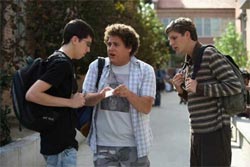 |
 |
Superbad will not be mistaken for a work of art -- cinematically, as is the case with all of Apatow's work, it's strictly middlebrow, and it takes full joy in ticking off most of the usual genre checkboxes. In this world, high school girls are comely, willing, and able, and even dweebs like Seth and Evan have their shot at happiness in the end. Yet this happiness is nothing if not wistful, as the two of them walk off in their arms of their would-be lady loves, casting farewell looks to each other at the local mall. Superbad is the first teen sex comedy in quite a while to capture that sense of passing youth, and recognize the glimmer of feeling in banality -- and if that's too highfalutin for you, take solace in the fact that the phrase "You cock-blocked McLovin!" will likely be immortalized in the American lexicon.

